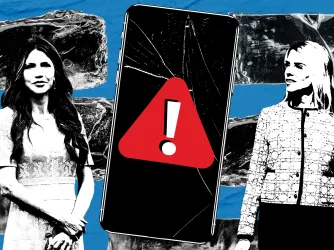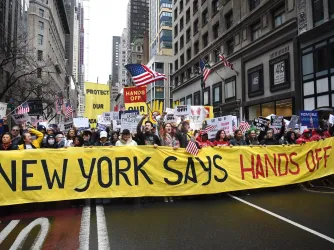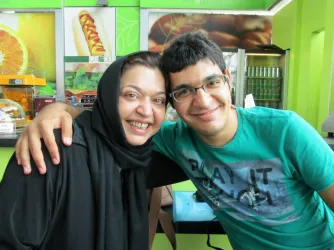Table of Contents
FIRE Campus Scholar hosts free speech conferences at Northeastern University

Students speak with FIRE Vice President Nico Perrino at Northeastern University on Nov. 15, 2022.
Arien Wagen is a senior at Northeastern University and a FIRE Campus Scholar.
When I started at Northeastern University in fall 2020, I had no idea how I wanted to spend my time as an undergraduate. Northeastern’s campus environment is shaped by its cooperative education (or “co-op”) program, and students tend to be very career focused. Most Northeastern students major in STEM or business fields.
I study business administration, but I’ve always had interdisciplinary interests and a passion for critical thinking. During my second year, I became very interested in the intersection of politics and philosophy, and that winter I read through classics like Plato’s “Republic” and George Orwell’s “1984,” which prompted me to think critically about the role of free speech in the university.
This past spring, I hosted discussions on democracy, liberal education, and personal freedoms through Northeastern’s Ortelian Society, a small undergraduate society dedicated to Classical and heterodox thought. I also published an article advocating for academic freedom in the Northeastern University Political Review. When I came across FIRE’s Campus Scholars program, I saw an opportunity to share my interests with the broader Northeastern community.
As a private university, Northeastern is not bound by the First Amendment like public schools. In the 2022 College Free Speech Rankings released by FIRE and College Pulse, Northeastern was ranked 155 out of 203, receiving a “below average” score. Northeastern is also classified as a “red light” institution in FIRE’s speech code rating system. Northeastern’s restrictive protest policy is one of its two “red light” policies.
With the help of FIRE as well as the Intercollegiate Studies Institute and members of the Ortelian Society, I hosted two mini-conferences to start conversations about free speech and civil discourse on campus.
Reimagining political discourse
The first mini-conference began with a lecture from David Corey, a professor of political science at Baylor University. In his talk titled “What Is Politics?,” Corey presented a model for understanding the means and ends of politics. He argued that citizens and politicians can understand politics as being either cooperative or competitive. Similarly, people can understand politics as either seeking to achieve society-level goals or individual-level goals. Given America’s size and pluralism, Corey concluded that the most productive way to understand politics is as the cooperative pursuit of individual-level goals.
These two mini-conferences engaged dozens of students in conversations about politics and the importance of free speech.
Understanding politics in this manner, which Corey calls the “politics of peace,” requires both moderation and toleration. The politics of peace recognizes that using national politics to legislate about culture war issues and other divisive issues is counterproductive because no political victory is permanent. Instead, national politics should focus on widely agreed upon aims like personal liberty.
Following this lecture, the Ortelian Society hosted an outing to Boston’s Freedom Trail and a discussion on John F. Kennedy’s “Address at Rice University on the Nation’s Space Effort.” Kennedy’s address took place while the U.S. was focused on the space race and the arms race, two society-level goals.
Defending free speech
The second mini-conference began with a talk from Nico Perrino, FIRE’s executive vice president, titled “Why Should We Defend Speech We Hate?” Perrino introduced the topic by talking about his childhood in Chicago and his own interest in free speech before introducing theoretical frameworks in support of free speech.
The first theoretical framework Perrino introduced was John Stuart Mill’s marketplace of ideas argument from “On Liberty.” This framework holds that unrestricted discourse is the best method for allowing people to correct their misconceptions and refine their true beliefs. Perrino also defended free speech on informational grounds: People’s speech gives others information about what they believe. As Harvey Silverglate, one of FIRE’s founders, says, “it’s important to know who the Nazis are in the room” so that we don’t turn our backs to them.
Perrino combined these theoretical frameworks with relevant pieces of history and pragmatic concerns, sharing stories about Maajid Nawaz and Amnesty International, Ann Coulter’s recent visit to Cornell, and the Berkeley Free Speech Movement. He concluded his talk with a short bio of Nat Hentoff, a Northeastern University alum and the author of “Free Speech for Me — But Not for Thee.” The second mini-conference ended with a discussion of Frederick Dogulass’ “A Plea For Freedom of Speech in Boston” and a trip to the Museum of Fine Arts in Boston.
These two mini-conferences engaged dozens of students in conversations about politics and the importance of free speech, helping students think critically about the values that support our liberal democracy, such as moderation and tolerance, and why we must defend these values against opposition to sustain our free society.

Recent Articles
Get the latest free speech news and analysis from FIRE.

FIRE sues Bondi, Noem for censoring Facebook group and app reporting ICE activity

Deep dive into New York’s proposed protest bans around houses of worship

Iran replaced my mother’s voice with silence


